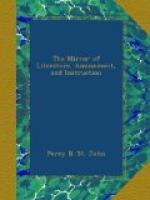On visiting the king, who resided at the village of Fangwot, we found him a well-formed and handsome man, apparently about thirty years of age; the upper part of his body was thickly covered with the Rang, or paint of turmeric and oil, which had been recently laid on in honour of the visit from the strangers. There was somewhat of novelty, but little of “regal magnificence” in our reception. In the open air, under the wide-spreading branches of their favourite Fifau, (Callophyllum Inophyllum) sat his Majesty squatted on the ground, and surrounded by a crowd of his subjects. The introduction was equally unostentatious; one of the natives who had accompanied us from the ship, pointing towards him, said, in tolerably pronounced English, “That the king.” His Majesty not being himself acquainted with our language, one of his attendants, who spoke it with considerable fluency, acted as interpreter. After some common-place questions, such as where the ship came from, where bound to, what provisions we stood in need of, &c., we adjourned to the royal habitation, which differed in no respect from the other native houses. Yams, bread-fruit, and fish, wrapped in the plantain leaves in which they had been cooked, were here placed before us, with cocoa-nut water for our beverage; plantain leaves serving also as plates.
The chiefs are elected kings in rotation, and the royal office is held for six months, but by the consent of the other chiefs, it may be retained by the same chief for two or three years. The royal title is Sho: the king to whom we had been introduced, as a chief, is named Mora. We had an interview also with the former king, named Riemko; he is a chief of high rank, and a very intelligent man: he spoke the English language with much correctness. Being naturally of an inquisitive disposition, and possessing an exceedingly retentive memory, he had acquired much information; this he displayed by detailing to us many facts connected with the history of Napoleon Buonaparte, Wellington, &c., which had been related to him by various European visiters, and which he appeared to retain to the most minute particulars. He surprised us by inquiring if we resided in “Russell-square, London?”
An innate love of roaming seems to exist among these people; they set sail without any fixed purpose in one of their large canoes: few ever return, some probably perish, others drift on islands either uninhabited, or if inhabited, they mingle with the natives, and tend to produce those varieties of the human race which are so observable in the Polynesian Archipelago. I frequently asked those of Rotuma what object they had in leaving their fertile island to risk the perils of the deep? the reply invariably was, “Rotuma man want to see new land:” they thus run before the wind until they fall in with some island, or perish in a storm. Cook and others relate numerous instances of this kind.




